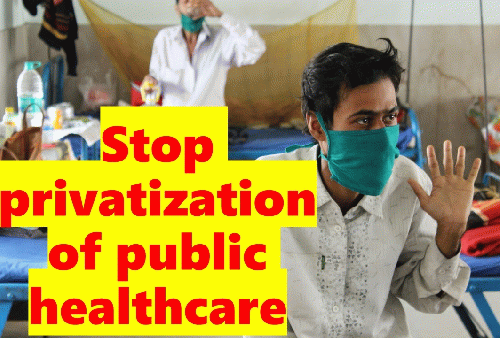
Public Private partnership is EQUAL to privatisation
(Image by CNS (Citizen News Service citizen-news.org)) Details DMCA
A senior citizen was not so lucky to get much-needed healthcare when government-run hospital declined him services. Health activist Rahul Dwivedi shares that in January 2020, a 72 years old patient was referred by government-run Bahraich District Hospital (in UP, India) to government-run tertiary-care hospital KGMU for urgent dialysis and specialized care. Patient who was already struggling to meet expenses in Bahraich, came under even more pressure to raise money to meet expenses for the ambulance transfer to Lucknow-based KGMU. When he reached KGMU despite his deteriorating condition, after several long hours of waiting, he could eventually get the preliminary checkups done for admission in medicine department. But was later 'advised' by a senior faculty to rather go to a private hospital in Lucknow. Duty doctors however referred him to outdoor patients' department (OPD) of another government-run Dr Ram Manohar Lohia Institute of Medical Sciences. But being a weekend, he had no money to stay in state capital Lucknow for additional two nights and try his luck on Monday morning (13 January 2020). He returned back to Bahraich without much-needed life-saving treatment and care.
When will we walk the talk on right to health?
The best judge if we are respecting right to health is: how the poorest of the poor, and most marginalized sections of the society, are accessing healthcare.
The Niti Aayog has unveiled a plan to hand over district government hospitals to private players. It claims that the guiding principles for the public-private participation scheme will be based on "international best practices". Firstly, worldwide in countries where health security for all citizens especially the most marginalized is guaranteed, it is through stronger public health systems, and not private. Secondly, public-private partnerships result in benefitting the private sector only, and thus is privatisation in garb of 'doing good'. That is why we condemn this Niti Aayog's plan to privatise India's public healthcare system (and other public services too).
It should be remembered that the Indian government's per capita expenditure on healthcare is among the lowest in the world (and in the South Asian region). The World Health Organisation (WHO) recommends that countries spend at least 4-5% of their GDP on health to achieve optimal healthcare outcomes. In the current central budget, the percentage of funds allocated for healthcare is 2.25%. This comes to about 1.4% of the GDP, which is much less even than the 2.5% of GDP goal for 2025 which is set by the National Health Policy of 2017. In contrast, India spends about 10% of its budget on defence. Several African nations committed to spend 15% of their budget on health (Abuja Declaration of 2001). In 2019, the Delhi government allocated 14% of its budget to healthcare.
In the absence of the political will to provide adequate funding to something as basic and essential as healthcare, placing the blame of the system's dismal performance on public sector inefficiencies and presenting this as a justification for privatisation, is clearly disingenuous. The problems of inadequate facilities, understaffed clinics and overworked and poorly performing personnel, which plague healthcare in India, are all linked to a lack of financial resources and bad governance, and cannot be solved without stronger government's commitment to public health, which includes significantly increasing healthcare expenditure. Privatisation can only lead to superficial short-term improvements, while inevitably reducing access for most-in-need by driving up costs, taking us even further from the goal of universal healthcare.
India has promised to deliver on the promise of universal health coverage (UHC) where "no one is left behind" in its National Health Policy of 2017 and UN Sustainable Development Goals. But privatisation of public health is pushing us backwards from these goals which are rooted in the human rights to health. The vision of universal healthcare coverage - which leaves no one behind - can only be achieved from robust and well-funded public health system which is not running on cost-to-cost or for-profit motives.
(Note: You can view every article as one long page if you sign up as an Advocate Member, or higher).





